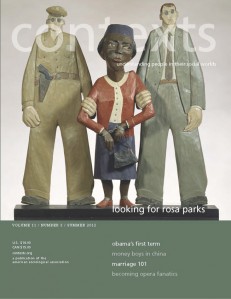
Summer 2012
Volume: 11 | Number: 3
But Madame, We Are French Also
Based on participant observation and interviews in the Parisian metropolitan region, sociologist Jean Beaman discusses middle-class and upwardly-mobile children of North African immigrants in France, who despite their upward mobility feel just as marginalized as other children of immigrants. Read More
Small Town, Big Totem
States build colossal and quirky sculptures celebrating local culture and place identity. Colby King and Matthew Cazessus provide a deeper look into these shrinking communities and explain how these sculptures work to maintain a sense of community and reaffirm local place identity in the face of dramatic demographic changes and economic uncertainty. Read More
Park(ing) Day
Park(ing) Day has become an international phenomenom since its inception in 2005. Gretchen Coombs explains how this urban intervention questions the use of public space and reimagines how urban public spaces can be repurposed to benefit local communities. Read More
Immigrant Dreams
Sociologist Smitha Radhakrishnan reviews the books The Managed Hand and The New Entrepreneurs. Each illustrates the opportunity and systematic discrimination faced by immigrant entrepreneurs in the United States. These works push us to reconsider the importance of minority business owners in continuing to make the American dream real for all of us. Read More
Breakthrough Books: Race and Racism
A "list" of what five sociologists consider breakthrough books about race and racism. Read More
Teaching a Hip-Hop Ecology
Sociologist Michael J. Cermak discusses what he learned while teaching environmental science with hip-hop in urban public high schools. This article provides an applied perspective of teaching at the crux of social justice and the environment. Read More
When History Intervenes
Sociologists tend to downplay the role of accidents, circumstance, serendipity, and luck. This essay describes three times that history derailed Michael Kimmel's research agenda, and how he "recovered." Read More
Marriage Goes To School
In recent years, policy efforts to alleviate poverty have focused on marriage and relationship education. Orit Avishai's, Melanie Heath's,and Jennifer Randles's research finds that efforts to address poverty via relationship skills training are misguided because this approach does not address the structural causes of poverty. Read More
The French Take Hollywood
While the United States dominates the global film market, strategies are available to non-U.S. filmmakers seeking to make their mark. Sociologist Diane Barthel-Bouchier discusses how the Oscar-winning French film, The Artist, used the strategies of solving the language problem, meeting cultural expectations, building connections with Hollywood insiders, and mounting a media charm offensive to win the 2012 Best Picture Oscar award. Read More
Killadelphia
Violent death is so commonplace in Philadelphia that it infuses the visual culture of the city with haunting imagery. Sociologist James Dickinson shows how memorial portraits, roadside shrines, sidewalk plaques, murals, billboards, and graffiti variously recall, memorialize, criticize, or comment on the epidemic of lethal violence in the City of Brotherly Love. Read More
